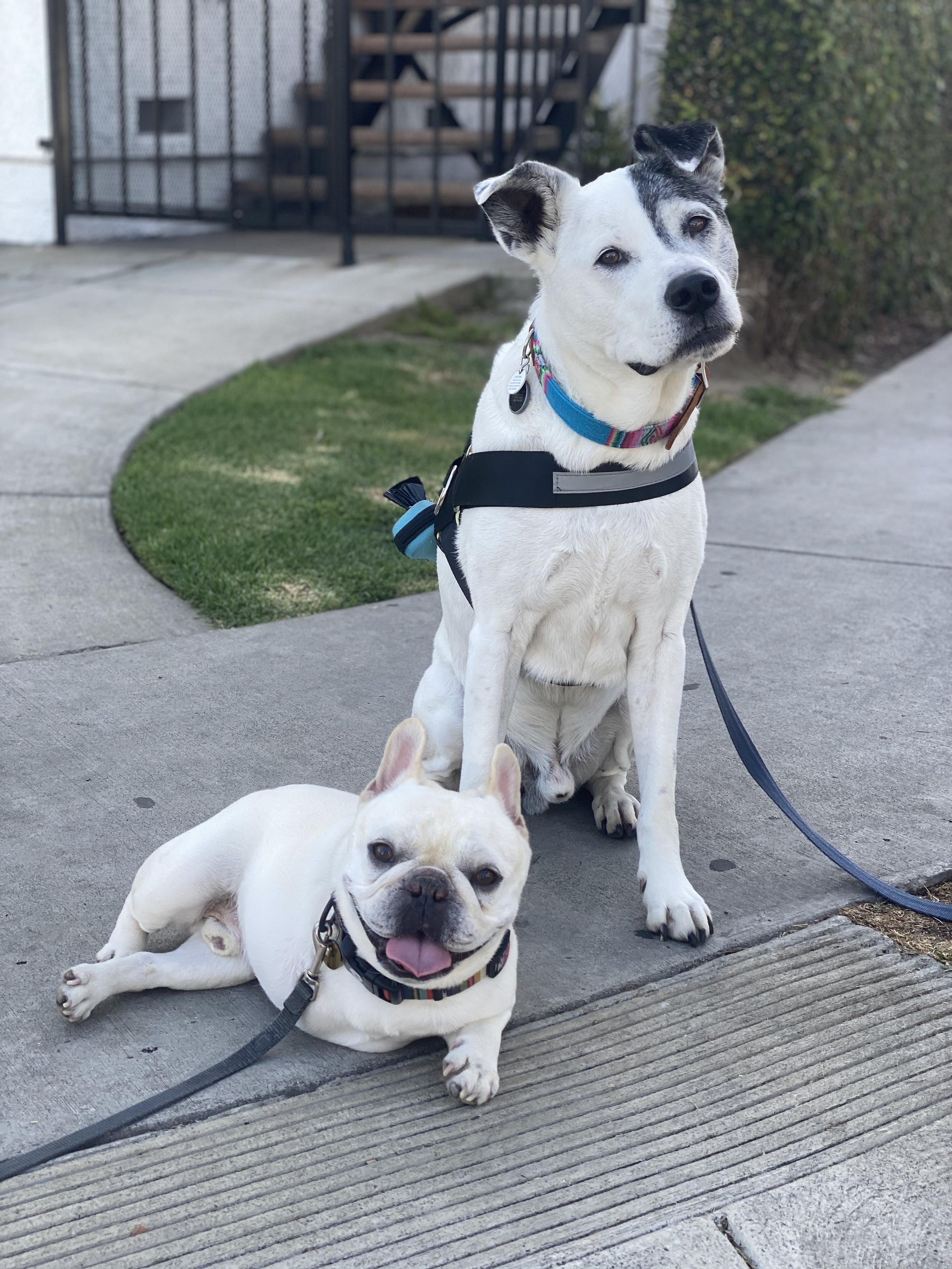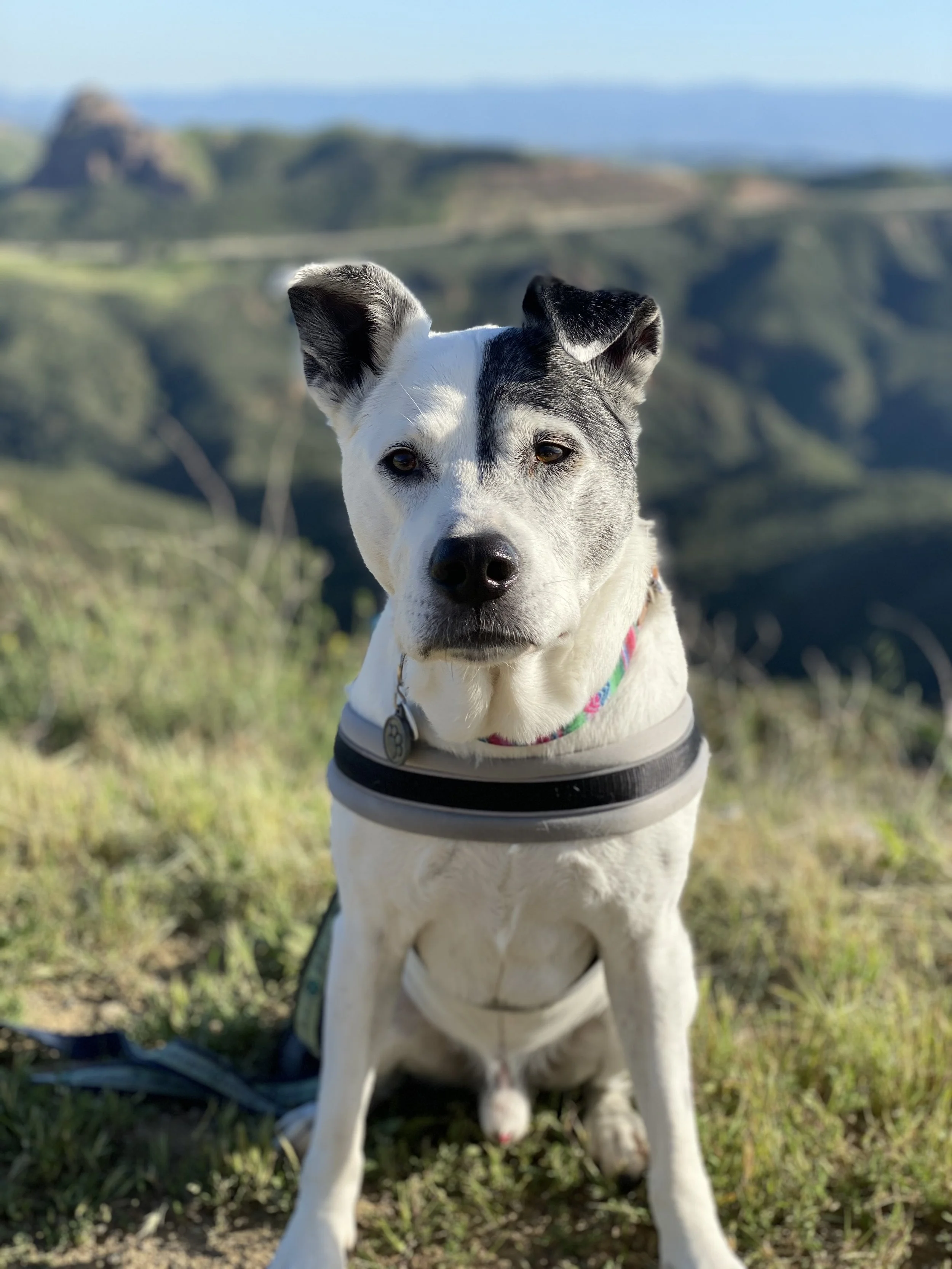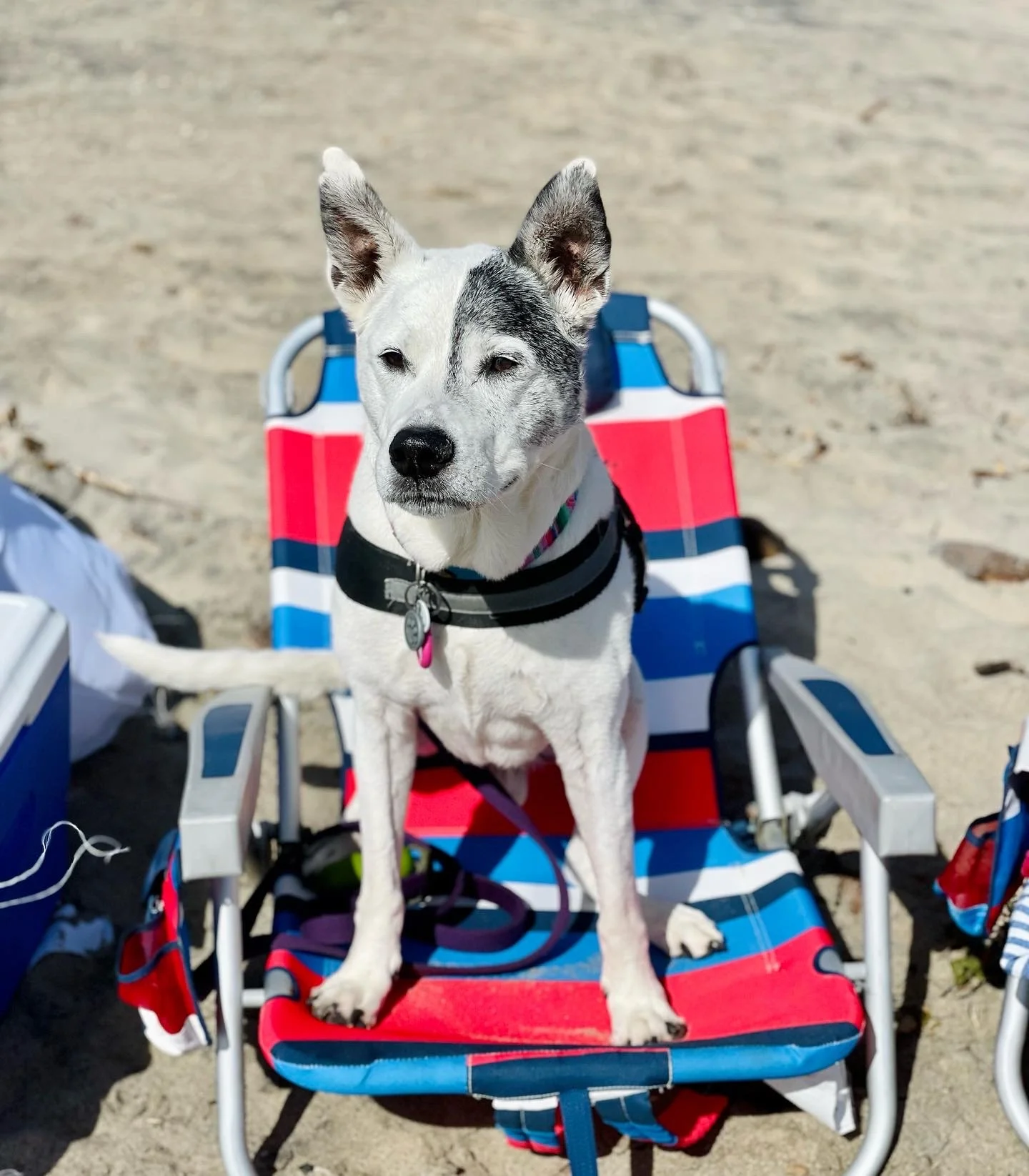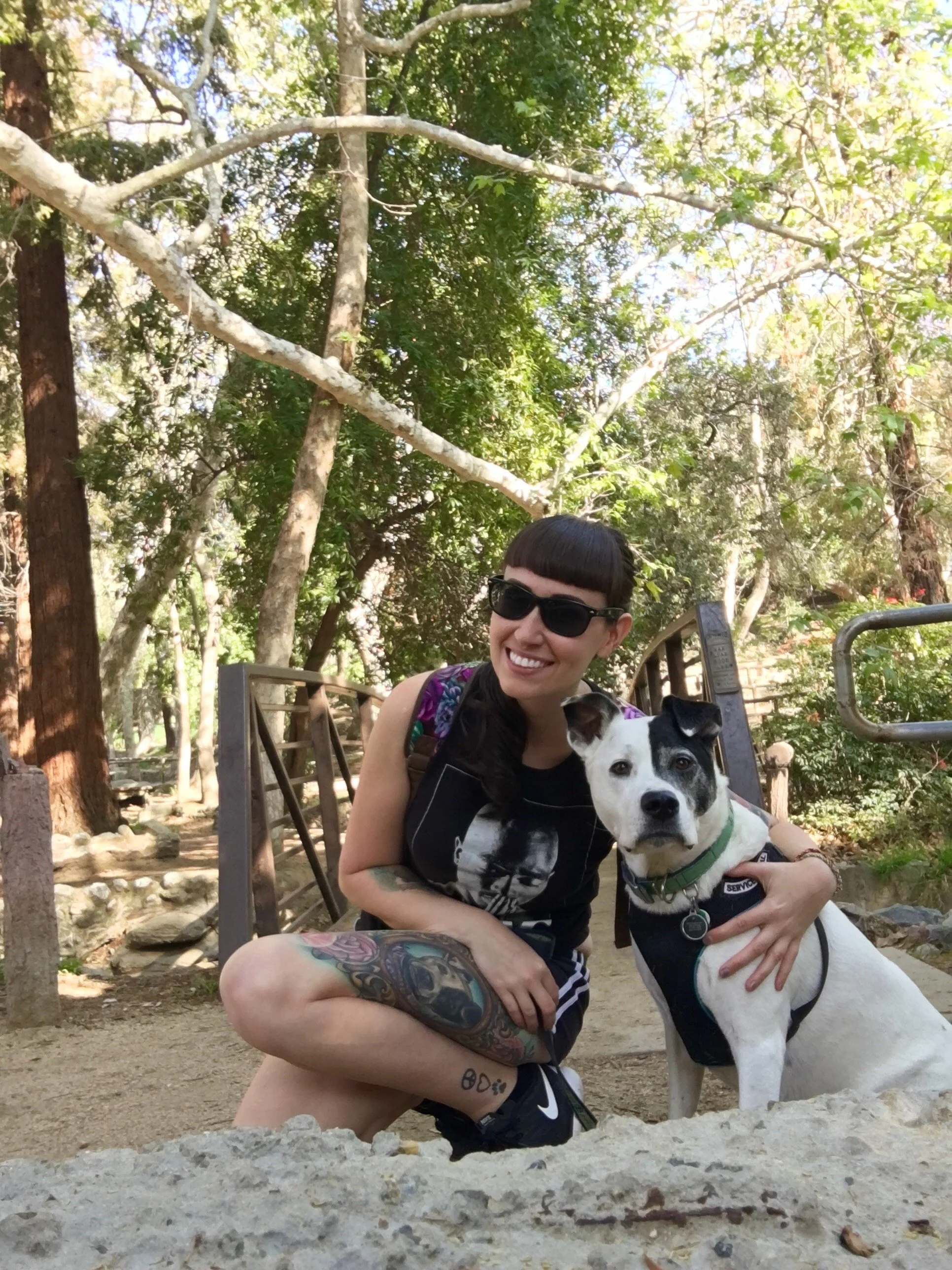Etiquette
Bringing your dog along on adventures can enhance the joy of outdoor experiences for both of you. However, it's crucial to be respectful, observant, and educated about their behavior and yours. This means understanding your dog's needs and limitations, being mindful of their interactions with other animals and people, and adhering to leash laws and trail etiquette. By being responsible pet owners, we can ensure that our outings are safe and enjoyable for everyone.
Dog-Friendly Retailers
Check the store's pet policy: Before heading out, make sure to verify that the store allows dogs and if there are any specific rules or guidelines you need to follow. Please don’t use fake ESA credentials - it’s very disrespectful to real-life service animals and their people.
Leash and control: Keep your dog on a leash at all times and maintain control over them to prevent any accidents or disturbances.
Behavior: If your dog is fearful , or is a barker, it might be best to leave them at home or have someone wait in the car with them while you run your errands.
Respect other shoppers: Be mindful of other customers and their comfort level around dogs. Keep your dog close to you and avoid letting them approach strangers unless invited.
Supervise closely: Keep a close eye on your dog to ensure they don't chew or damage any merchandise. Also, watch for signs of stress or discomfort in your dog and be prepared to leave if necessary.
Clean up after your dog: Always clean up any messes your dog may make inside the store, whether it's a bathroom accident or shedding fur.
Never: Tie your dogs up outside of an establishment while you go inside. There’s about a hundred things that could go wrong here - your dog could get loose and run away, your dog could be taken, there could be issues with other dogs passing by or it could create a fearful situation for your dog.
Dog-Friendly Hotels
Pet policies: Familiarize yourself with the hotel's pet policies before booking your stay. This includes any additional fees, weight restrictions, and rules regarding where your dog is allowed within the hotel premises.
Pet amenities: Check if the hotel offers amenities for pets, such as designated walking areas, pet-friendly rooms, or pet-sitting services. This can enhance your dog's comfort and overall experience during the stay.
Behavior: Ensure that your dog is well-behaved and considerate of other guests and hotel staff. Keep your dog leashed in public areas and clean up after them promptly to maintain a clean and respectful environment. If your dog is a barker or a talker for any reason, consider situating them with a great dog sitter or opting for an Air BnB so disturbing other guests won’t be an issue.
Comfort items: Bring along familiar items from home, such as your dog's bed, toys, and food bowls, to help them feel more comfortable and settled in the new environment.
Emergency preparedness: Be prepared for unexpected situations by having your dog's identification, vaccination records, and contact information for local veterinarians readily available. Additionally, know the location of nearby pet-friendly facilities in case of emergencies.
Dog-Friendly Restaurants
Check restaurant policies: Before visiting, ensure that the restaurant allows dogs in outdoor seating areas and understand any specific rules or restrictions they may have regarding pets.
Behavior: Ensure that your dog is well-behaved and accustomed to being in public settings. Keep your dog on a leash and under control at all times to prevent disturbances to other diners and ensure their safety.
Comfort: Bring along essentials such as water, a portable bowl, and a comfortable mat or blanket for your dog to sit on. Consider bringing a favorite toy or chew to keep them occupied while you dine.
Safety: Choose a spot away from foot traffic and ensure that your dog is not blocking pathways or creating obstacles for servers or other guests. Be mindful of hot surfaces and potential hazards, and keep your dog away from areas where they could access food or drinks that may be harmful to them.
Clean up: Be responsible for cleaning up after your dog by promptly disposing of any waste and ensuring that they do not create a mess or disturbance in the restaurant. Respect the establishment and other patrons by leaving the area as clean as you found it.
Hiking Trails
Leash regulations: Check the trail's rules and regulations regarding dogs, including leash requirements and any restricted areas. Always keep your dog on a leash.
Fitness level: Choose a trail suitable for your dog's fitness level and physical capabilities. Start with shorter, easier trails if your dog is new to hiking or if they have any health concerns.
Weather conditions: Be mindful of the weather and how it may affect your dog. Avoid hiking during extreme heat or cold, and be prepared with plenty of water to keep your dog hydrated. Consider booties to protect their paws from hot surfaces or rough terrain.
Wildlife encounters: Keep an eye out for wildlife such as snakes, insects, or larger animals like bears or mountain lions. Be prepared to handle encounters safely and keep your dog close to you to prevent them from chasing or approaching wildlife.
Leave no trace: Practice Leave No Trace principles by picking up after your dog and disposing of waste properly. Pack out any waste bags and avoid allowing your dog to disturb or damage natural habitats.
Trail etiquette: Be courteous to other hikers by yielding to passing hikers, keeping your dog under control, and avoiding crowded trails during peak times. Respect trail regulations and be mindful of any signs indicating sensitive habitats or wildlife areas.
The Beach
Check local regulations: Before heading to the beach, familiarize yourself with any rules or regulations regarding dogs. Some beaches have specific areas where dogs are allowed or prohibited, and leash laws may vary.
Bring essential supplies: Pack plenty of fresh water to keep your dog hydrated, as well as a portable water bowl. Consider bringing shade such as a beach umbrella or pop-up tent to provide relief from the sun, especially on hot days.
Protect their paws: Sand and hot surfaces can be rough on your dog's paw pads. Consider using dog booties or paw wax to protect their feet, especially if the sand is hot or there are sharp objects like shells or rocks.
Supervise closely: Keep a close eye on your dog at all times, especially near the water. Waves, currents, and tidal changes can pose risks to dogs, so avoid letting them venture too far into the water, especially if they're not strong swimmers.
Clean up after your dog: Bring waste bags and promptly clean up after your dog to keep the beach clean and enjoyable for everyone. Dispose of waste in designated trash bins or carry it out with you if no bins are available.
Be mindful of other beachgoers: Respect the space of other beach users by keeping your dog under control and preventing excessive barking or unwanted interactions with other people or dogs. Follow any posted rules or guidelines regarding dog behavior.
The Dog Park (even though we don’t recommend them)
Vaccinations and health: Ensure that your dog is up-to-date on vaccinations and in good health before visiting the dog park to prevent the spread of diseases.
Supervision: Always supervise your dog closely to monitor their behavior and intervene if necessary. Pay attention to how your dog interacts with other dogs and be ready to step in if any conflicts arise.
Respect other dogs and owners: Be mindful of other dogs' play styles and temperaments, and respect their space if they seem uncomfortable. Additionally, always pick up after your dog and maintain good etiquette with other owners.
Follow park rules: Familiarize yourself with the rules of the dog park and abide by them at all times. These rules may include leash requirements, dog size restrictions, and designated areas for certain activities.
Be prepared: Bring essentials such as water, your dogs’s leash and poop bags. Additionally, be aware of any hazards in the park, such as uneven terrain or aggressive dogs, and take appropriate precautions.
Never: bring your unaltered dog to a dog park, bring your puppy under 6 months of age to a dog park, bring treats or food into a dog park, or bring your dog if they have fear issues, behavioral issues or aggression issues. Ever.
Additional Etiquette Resources
Dog Friendly Places Nationwide
The Good Boy Foundation is committed to providing valuable resources and education to empower pet parents in caring for their furry companions. However, it's important to note that the information provided on our website is intended for educational purposes only and should never replace the advice or treatment provided by a licensed veterinarian. While we strive to offer accurate and helpful guidance, we cannot be held responsible for any outcomes or consequences resulting from the application of this information. Pet parents are encouraged to consult with their veterinarian for personalized guidance and recommendations tailored to their pet's specific needs and circumstances.







